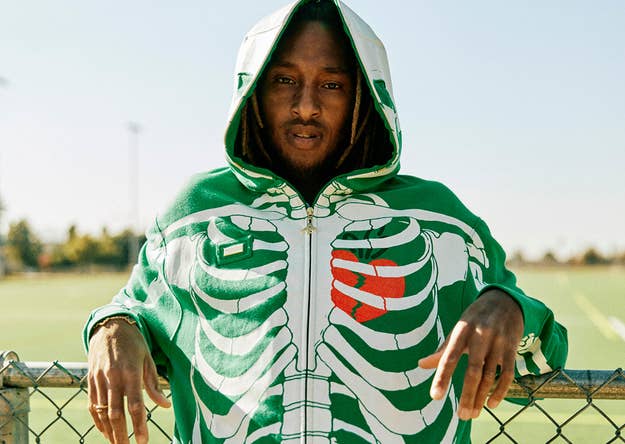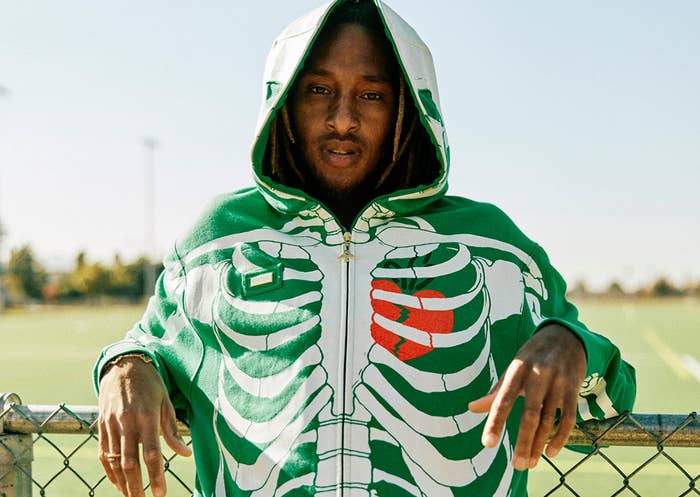
When Anwar Carrots was approached about doing a collaboration with LRG, he immediately knew what he wanted to create. His own take on LRG's Dead Serious hoodie, an iconic design famously worn by Kanye West in 2007 at the Stella McCartney show, was a no-brainer.
“I had mocked up like six of them. I had colors of it,” Carrots tells Complex. “They let me rock.”
While only the kelly green zip-up hoodie will actually release, Carrots also made an orange Dead Serious long sleeve T-shirt. The idea was to make the design more accessible by placing it on a more affordable garment.
“I was like, ‘How come you guys never made a long sleeve with this? There's people that can't afford the hoodie. Give them a chance to get in,’” says Carrots. “It's like art. Not everybody can buy a full painting, but we can buy a print.”
The skeletal pieces aren't the only items set to hit LRG’s web store on Feb. 2. Designed under Carrots’ creative direction, the capsule ($30–$110) also includes forest green hoodies and sweatpants, graphic T-shirts, a black crewneck, and a bucket hat stamped with special LRG x Carrots logos.
Carrots x LRG is a full-circle moment for the 32-year-old designer, who founded his namesake streetwear label in 2015. As a teenager in the 2000s, Carrots would buy LRG T-shirts from Up Against the Wall, an urban wear retailer from the era with outposts in malls across California and the DMV area. In May 2011, he paid a visit to LRG’s headquarters alongside Casey Veggies and Joshton Peas, and was able to meet founder Jonas Bevacqua just a few weeks before he passed. The trio behind Peas & Carrots would also appear in one of LRG’s signature magazine campaigns in 2012. This project is a way to honor that era.
“I'm treating it with respect versus a money grab. I think of it more as a cultural stamp. The teacher is finally graduating the student type of shit,” says Carrots.
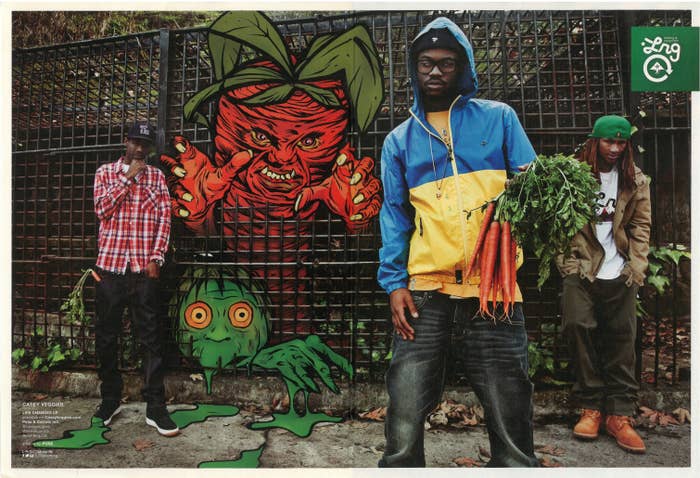
The Carrots collab is the latest effort by LRG to spark a comeback. Despite staying afloat (the brand is celebrating its 25th anniversary this year), it has certainly faded a bit into obscurity since its heyday in the 2000s and early 2010s. LRG was one of the hottest brands in the world, standing toe-to-toe with NIGO’s Bape, although history has been a bit kinder to the Japanese streetwear label. Rap stars like Kanye West and Drake appeared in LRG's campaigns. It was raking in hundreds of millions in revenue a year. Bevacqua became an icon in his own right, known for flexing his massive diamond chains and expensive fleet of luxury cars as he rubbed shoulders with A-list celebrities. His tragic death in May 2011 coupled with the brand’s oversaturation in mall stores like Zumiez eventually dampened LRG's cool factor. But can it re-enter the conversation once again in 2024 as more than just a symbol of a bygone era of streetwear?
“Unfortunately, Jonas passed away. He didn’t just leave the brand. If he was still here, I think it definitely would have a chance. Now there’s just no one to attach it to,” says Carrots. “But I think [my collab] just gives LRG room for a new future, new collaborations, new people to work with.”
We got a chance to hop on the phone with Carrots to chat about the significance of his LRG collab, what the term ‘streetwear’ means in 2024, his thoughts on the current streetwear scene in Los Angeles, and more.
This interview has been edited and condensed for clarity.
How did the LRG project come about?
Honestly, it stems back like 12 years ago from first meeting Jonas [Bevacqua]. We all got brought in by this guy named Spencer. This is when I was still working with Casey Veggies. We went there. He gave us a tour, gave us gear. We actually did a collaborative New Era for Casey and LRG at the time. They actually did an ad of all three of us—me, Josh Peas, and Casey—for that. So the relationship was already there.
Fast-forward to September 2022, they have a new team now, but the new team is technically the old team. They brought in Kev [Delaney]. Kev is like the main marketing manager. So he hit me up like, ‘Would you be down to do LRG?’ And I'm like, ‘Duh.’ [Laughs.] We’re in a space in fashion where guys and gals work with who they want to work with based on popularity. I just like doing what I like to do and whatever makes sense for my training growing up. LRG transcended from what urban fashion was into what streetwear was at the time. He had the best of both worlds. Jonas was his own icon, and the brand was a thriving business. People viewed him as a tastemaker. He was with Kanye, this person, and that person. But the brand was everywhere. It was in Macy’s. It was in Up Against the Wall. It was in these big doors. It was just awesome to watch that man become an icon personally, his own brand within himself, and also have the brand go in other directions that weren’t considered elitist.
Everybody’s business is different. You work within your means. Bape had its own thing. It only did its own stores. It only worked with its people. That’s how they kept it. I always liked how Jonas was like, ‘I don’t give a fuck. I work with who I want to work with.’
What you’re saying about LRG sort of feels like what you have with Carrots now.
To be honest, I never really looked at the blueprint that they had for myself. These days, I’m more aware of things for what they are. I would definitely say I'm a big student of the LRG blueprint now. It wasn’t as hyped up as the Bape shit, but if you paid attention in America, that was our Bape.
LRG was so huge, but it faded over time. I feel like Jonas and LRG don't always necessarily get the recognition.
I think it does, but we covet the LRG ads more than we do the clothing. To be honest with you, I can't really tell you my favorite LRG piece offhand. I only personally owned like one or two pieces. I wasn't fanning out like that, but I did rock with bro as a person.
I also think that was the crossover between what we found cool with urban wear. You had Rocawear, Sean John, Enyce, Akademiks. We found that cool because we fucked with the artists. We didn't really understand what was going on beneath that. Then, your brain switches and you start finding the Stüssys of the world, The Hundreds, all this other stuff you find cooler than LRG. These brands are being carried in these stores that aren’t as documented. It’s “if you know, you know” type of shit. The perception changed. What we found cool was no longer cool. It’s kind of weird to think about it now. Jonas would be looked at how we look at NIGO if he was still alive. People just don’t want to compare the two. It’s perception.
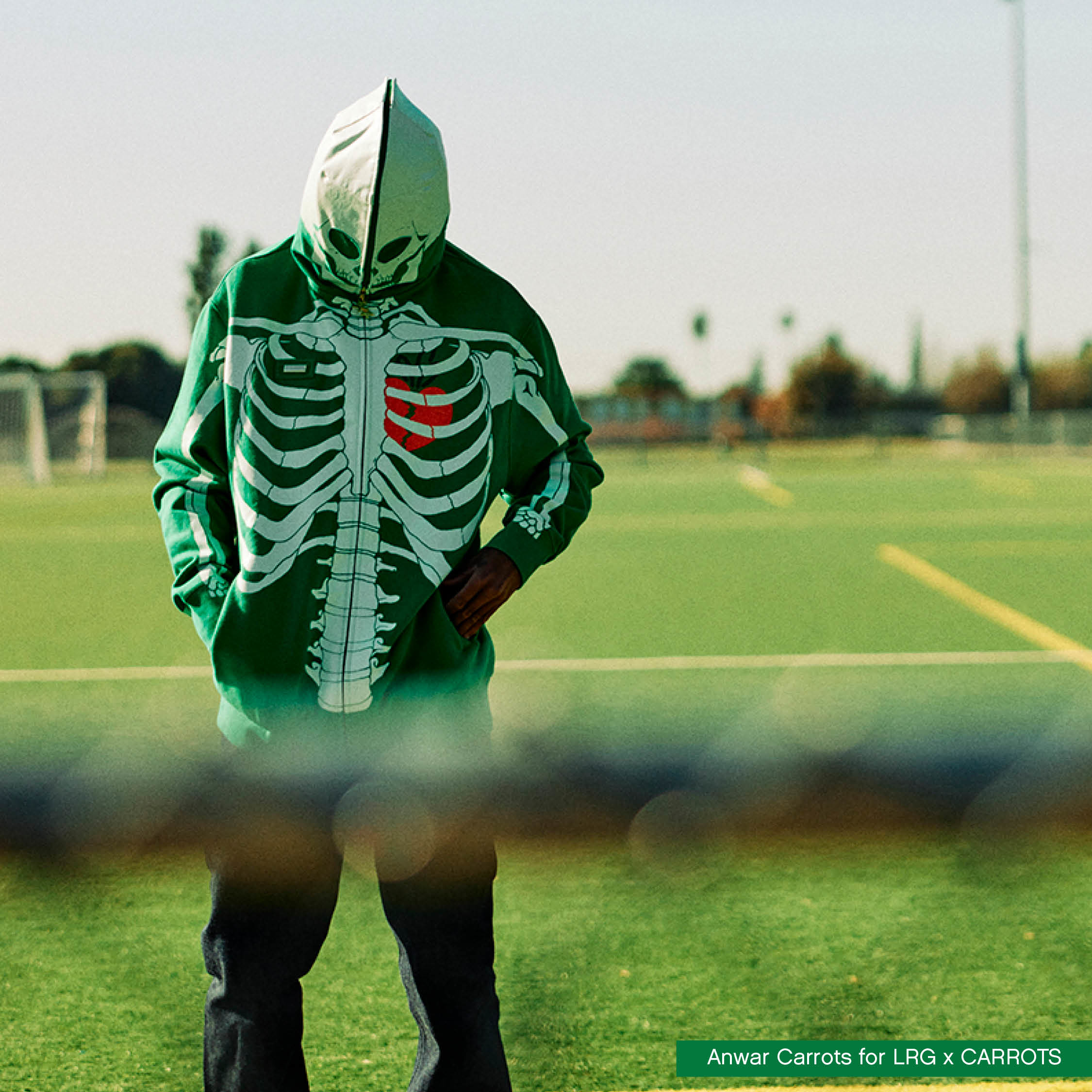
You're doing your own version of the Dead Serious hoodie, which is probably the most iconic piece that LRG has ever done. Was that like a non-negotiable for you?
When I came into it, I was like, ‘You already know what I'm trying to do. Let's get to it.’ I had mocked up like six of them. I had colors of it. I already knew they were just going to be like, ‘We gotta do one.’ So I'm like, ‘Y'all pick which one y'all wanna do.’ They let me rock. And we did a long sleeve. I was like, ‘How come you guys never made a long sleeve with this? There's people that can't afford the hoodie. Give them a chance to get in.’ It's like art. Not everybody can buy a full painting, but we can buy a print.
Is that why you did the long sleeve? So more people can get it?
Exactly. Plus, the long sleeve is fire.
Were you surprised that they let you do it?
I wasn't really because—and this is no disrespect to the LRG team—who else are they going to work with that makes sense as a brand, that's not considered a heritage brand? You want to peter back into this world today. Who are you going to work with that matches your aesthetic? There’s me, and that’s really it, because I fluctuate between high and low.
No one's really part of streetwear culture like that anymore. People make streetwear clothing to make money. But you know, it wasn't all about that for me. It was about showing up at the right time, right place, being at all these events, paying respect to the people who opened the gate for us to do this shit further, and also being aware even if they're not of hip-hop culture. A lot of the streetwear shit was derived from hip-hop shit, which is Black culture. Me, myself, and those of that same melanin are Black culture. To watch a community pay homage to hip-hop and Black culture so strongly, I said, ‘I gotta be a part of this because there's not many people that look like me, of this melanin, in this space.’ This was the step to the left of urban wear. In order to be an urban wear owner, you had to be from an urban community and you had to be of Black descent. There's no white urban brands. It doesn't exist. So I felt like I'm here to play both sides of good taste and also good taste in the Black, hip-hop, and urban wear space.
I care so much that I'm a part of all of it, and that's also what helps me to adapt and keep moving forward into the future. Care and love. That's why I feel like I never got grouped into the space like, ‘He's selling out. He's in PacSun and Zumiez.’ It's more so people were like, ‘Damn, bro. You got your shit in Zumiez? I’m copping,’ because they know where I came from personally and where I was trying to take this shit.
That’s funny. I was going to mention PacSun because, to your point, some brands would be called a sellout, but that hasn’t happened with Carrots.
Also shoutout to Jerry Lorenzo and the Fear of God thing. The LRG thing extends all these conversations because it was one of the first brands to take it there.
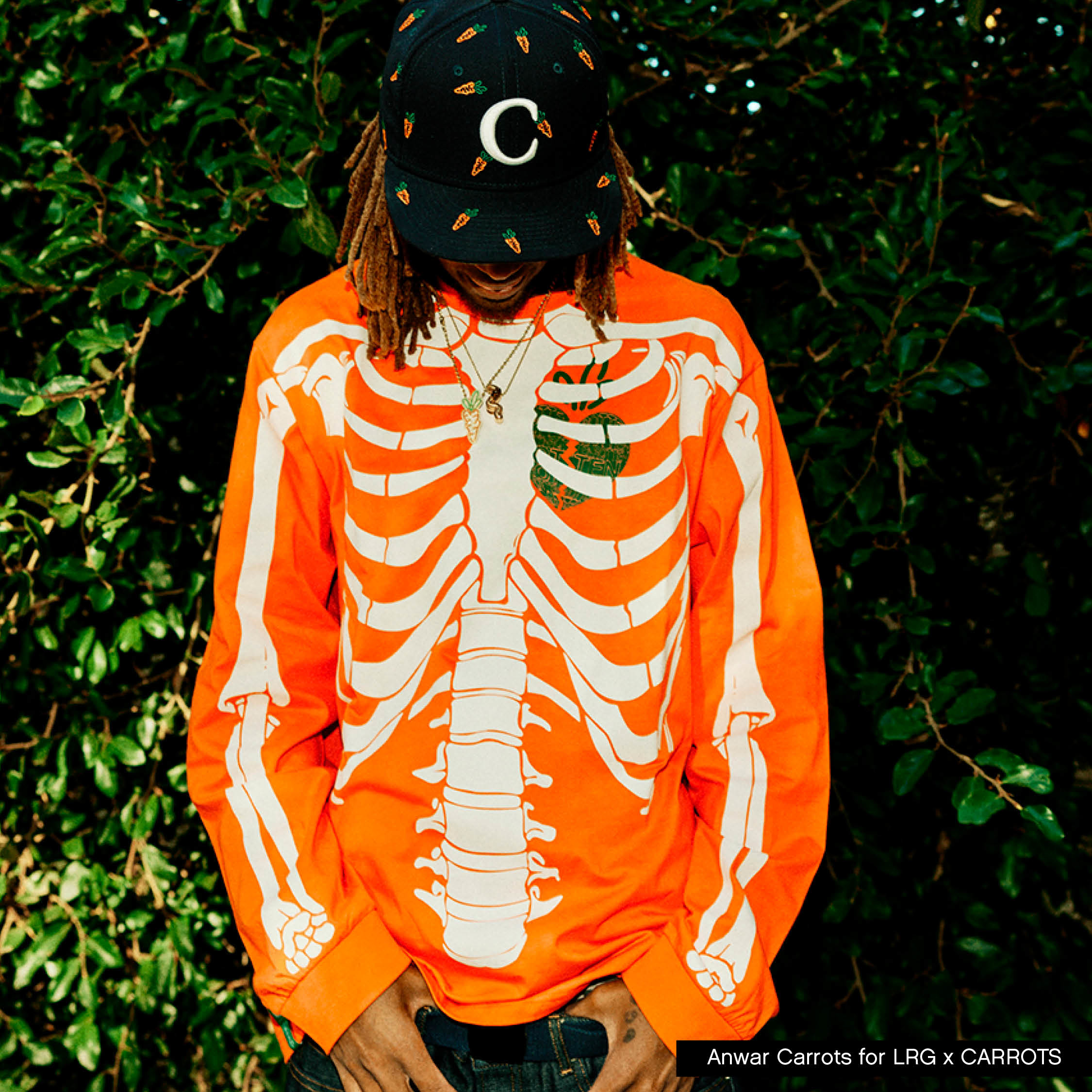
What do you think about LRG trying to make a comeback in the space right now?
Honestly, I’ve been thinking about that this whole week. Where does this go after me? I don’t know. It’s weird man. I can’t call it. You can’t replicate the brand anymore. It goes back to the NIGO thing. Unfortunately, Jonas passed away. He didn’t just leave the brand. If he was still here, I think it definitely would have a chance. Now there’s just no one to attach it to.
With this collection, I’m the creative director. They let me rock. They picked a partner that actually makes sense with the brand. Obviously, they could have went with someone more popular than me, but would it have made sense? Probably not. Would it have made some money and sold? Yeah, probably. But I feel like with my touch on it, it gives LRG a chance to go back to looking at it in the sense of nostalgia because that's how I'm treating it. I'm treating it with respect versus a money grab. I think of it more as a cultural stamp. The teacher is finally graduating the student type of shit. But I think it just gives LRG room for a new future, new collaborations, new people to work with.
Are there other iconic streetwear items like the Dead Serious hoodies that you’d love to do a Carrots version of?
If I ever had a chance to do the Bathing Ape x KAWS Animal Kingdom hoodie, to me that was my favorite Bape piece ever. There’s a lot of things I’d like to redo, but that’s what comes to mind.
How do you feel about the term streetwear right now?
I still consider it a thing because there's still players that still exist in that space. There's still a community, and a culture of people in it. A lot of the players who were involved with these brands are now doing singular projects, or working with actual pop stars, or they're opening agencies now. Shit. I just got signed to Def Jam. I'm about to put out an album that leads to joint ventures. Now I'm an executive producer signing artists. But what's the root of all this shit? It came from streetwear. It still exists.
I still consider the word a thing. For other people, I can't say the same because people will call you out for using that term if you didn't grow up in it. There's no real streetwear scene anymore. Where's the scene? The last person that I can deem is actually streetwear is Clint419. And that's why he's winning right now. He’s fucking the game up.
How do you feel about streetwear figures like NIGO and Pharrell at luxury fashion houses like Kenzo and Louis Vuitton?
I appreciate it because it helps open the door for me to even be at a Hollister or Abercrombie and Fitch. I don't mind being a creative director at Abercrombie and Fitch. I don't mind going to American Eagle. Everything is being considered streetwear. So it just keeps opening up the door for people like myself. I love it. Keep it going. I'll take all y'all scraps. Give me the b grade of anything. [Laughs.] It keeps me working. It keeps my world alive.
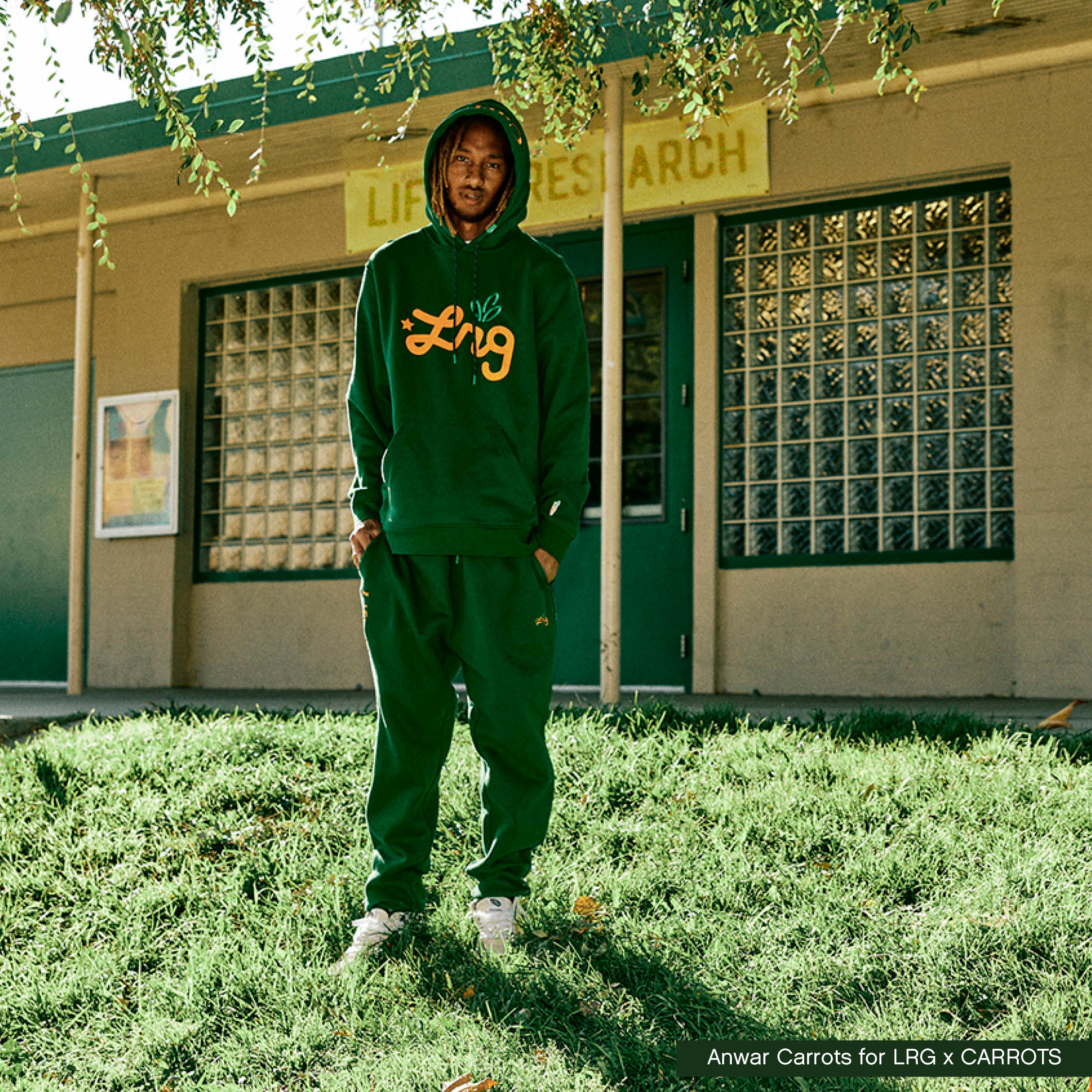
What did you think about seeing the conversations about Karmaloop a few weeks ago?
When Karmaloop was crackin’, I was outside. I didn't buy shit online until I got older. At that time, I was used to hand-to-hand shit. I was working retail for one of the brands that you could have bought off Karmaloop. I wasn't one of those who perused that site or anything like that because I lived in Los Angeles. It was at my fingertips. If I wanted some 10 Deep, I could just go down the street to Brooklyn Projects. If I wanted Supreme, I'd just go to Supreme. You couldn't even get Supreme on Karmaloop. In ‘08, I was heavy rocking Polo ‘cause of the music shit and Young Dro, the white boy swag. I was in tune to different shit to where Karmaloop had nothing to do with me.
We were featured on Karmaloop TV though. I said I wanted to do a Peas and Carrots collab with Toto, the toilet company. That’s just where my brain was at. Years later, I see Samuel Ross from A-Cold-Wall do a collaboration with Kohler. So I wasn’t wrong. [Laughs.]
But yeah, the Karmaloop thing had nothing to do with me. So when I said what I said, some people got upset. But I’m like, this is not an act. I was living in Los Angeles when you guys were online shopping. But I’m also happy for those people who got to live out what they saw and cop from the brands they saw on different artists and blogs.
You talk about living that era, and you have such a connection to Fairfax. What are your thoughts on the sentiment that Fairfax is dead?
People still talk about Fairfax. Key people just chose to leave. Mind you, it's LA. It's a city with different pockets. It's different from New York. It's not just SoHo. Each pocket is poppin’. Larchmont is crackin’. Brentwood's crackin’. Century City is crackin’. Everybody has their own shit going on in different areas. Where we happened to grow up and live, we didn't have the opportunity to have retail stores around us that were fresh. We had the Crenshaw Mall to go buy fitteds or Up Against the Wall at the Fox Hills Mall. If you didn't have the knowledge to leave your neighborhood to go seek other things that you desired, you were stuck with what you had.
Me and my friends sought after other things. I was able to find Union. I was able to find Stüssy. Shoutout to Mapquest. I got put on to Supreme in ‘06. The first day I went there, I got a Supreme shirt for free. It was more of a respect thing. It’s different from just shopping.
Fairfax is dead as far as the shops you want to shop at, but it’s not necessarily dead. The GOLF store is still there. What’s dead is the spirit of the people who were around. They’re no longer over there. But that doesn’t make Fairfax dead because we weren’t the ones telling you to come shop there anyway. You went there for the brands like Diamond Supply, Hall of Fame, The Hundreds, 424. People who came to see us were just stalking and being weird. They weren’t there to integrate. We were there to kick it with the dudes who worked at the shops and get out of South Central to be around something more positive. That was our hub during the day. That’s what brings energy to areas, the people.
Fairfax is still alive and thriving when it comes to food. I pray that the street just becomes all food how it used to be all shops. All ill-ass restaurants. You see shit like that in New York. You don’t see shit like that in LA. You gotta drive to different spots.
The new shit right now is Little Tokyo Table Tennis. They have a brand attached to it that’s pretty fresh. But it’s a hangout. I just put out the “Carrots Cypher.” Buddy starts the verse out, “I’m at Little Tokyo Table Tennis, eatin’ raw coochie like sushi, my favorite dinner.” Saying shit like that is highlighting a space and community. That’s where culture resides. That’s what made Fairfax hot. It wasn’t the stores. It was the people who pulled up and were accepted to kick it there. Otherwise, you weren’t welcomed. People are always like, “I wish I was there.” If you were there, you would have just walked to the shops, stared at us weirdly, and kept pushin’ like everybody else did. Especially with Tyler [the Creator]. The Tyler shit got so wild that it became a show for us. One day Lupe [Fiasco] pulls up with his girlfriend. One day Drake calls to see if I’m at the office. Because they wanted to see what it is. Honestly, it was just some close-knit LA shit that you will never understand. We tapped in with each other on a third-eye level.

